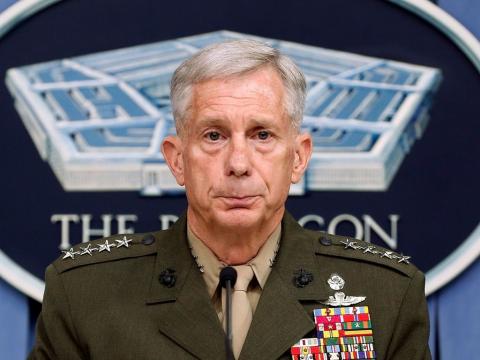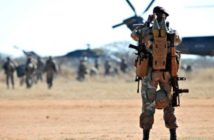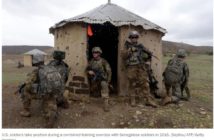Politico SL
By Abdul Tejan-Cole
Last Sunday, gunmen in Dablo – a commune in Sanmatenga Province in central Burkina Faso which is approximately 124 miles from the capital, Ouagadougou – attacked a Catholic church during mass and killed a priest and five worshippers.
In addition to the attack on the church, the terrorists set fire to a health center and destroyed shops selling alcohol. Although there was no immediate claim of responsibility, the attack bore the hallmarks of Islamic extremist groups linked to the Islamic State and al-Qaeda such as Jama’a Nusrat ul-Islam wa al-Muslimin’ (JNIM) (Group to Support Islam and Muslims – GSIM) which is a merger of al-Murabitun battalion, Ansar al-Dine, the Macina Liberation Front and al-Qaeda in the Islamic Maghreb (AQIM).
It was the second attack on a church in five weeks in Burkina Faso. Four worshipers and a pastor died in an attack on a Protestant congregation in Silgadji in late April. And just last week two French Special Forces’ soldiers were killed in a military raid that freed four hostages who had earlier killed Fiacre Gbédji, a Beninois tour guide.
Earlier in the year 10 gendarmes were killed near the Malian border in an attack claimed by JNIM. Between 2015 and 2018, it is conservatively estimated that at least 270 people have been killed in Islamic related attacks including the January 2016 attacks at the Cappuccino restaurant and the Splendid Hotel in central Ouagadougou.
In the past two years attacks by Islamist groups in Burkina have quadrupled. In a rare video released by Al Furqan, an Islamic State media group, their leader Abu Bakr al-Baghdadi praised the militant groups in Burkina Faso for pledging allegiance to Islamic State. He urged them to take “revenge for their brothers in Iraq and Syria” and called for more attacks against France and other “crusader” nations.
Apart from Burkina, there have been similar destabilizing attacks in neighboring Mali and Niger. A few weeks ago, jihadists attacked a military camp in Guiré in west-central Mali and killed at least 11 soldiers. The Group Support for Islam and Muslims (GSIM) claimed it was behind the attack. In March, at least 160 Fulanis alleged to have been harboring jihadists were massacred in the town of Ogossagou in the central Mopti region. Mali has been under a state of emergency since 2015 and large swathes of the country remain outside the control of the government.
In Niger, in response to terrorist attacks the government declared a state of emergency on 3 March 2017 in Diffa region, in Ouallam, Ayorou, Bankilare, Abala and Banibongou (Tillabéri region) and Tassara and Tillia (Tahoua region). These three countries, Mali, Burkina Faso and Niger, are now the epicenter of instability in the Western Sahel.
The response to increased insurgency has been mostly military. In 2014, as a successor to its first mission, Operation Serval, the French set up Operation Barkhane, named after a crescent-shaped dune in the Sahara desert. The main goal of the operation was two-fold: to assist the G5 Sahel armed forces in fighting terrorist networks in the Sahel-Sahara region and allow for a “rapid and efficient intervention in the event of a crisis” in the region.
Although the operation has had some successes, it is acknowledged that it is not the long term solution. The same can be said of the United Nations Multidimensional Integrated Stabilization Mission in Mali (MINUSMA). The Mission which was set up to support the transitional authorities of Mali in the stabilization of the country and implementation of the transitional roadmap has not had much success. Dubbed the most dangerous peacekeeping operations in the world, the UN Security Council has indicated its intention to downsize the mission in the absence of any progress since the signing of the “Agreement for Peace and Reconciliation in Mali, resulting from the Algiers Process” (the “Bamako Agreement”) in 2015.
Following the setting-up of Operation Barkhane by the French, the leaders of Niger, Burkina Faso and Mali – together with Mauritania and Chad – came together to launch a counterterrorism alliance known as G5 Sahel. Although it was created in December 2014 in Nouakchott under the leadership of Mauritanian President Mohamed Ould Abdel Aziz, it remained largely dormant. Its mandate is to fight terrorism, cross-border organized crime and human trafficking in the G5 Sahel region and to coordinate their efforts to combat the growing threat from Al Qaeda and indigenous terror groups.
It also aims to coordinate development policies such as the desalination of the Niger River, the asphalting of regional roads and the creation of electricity interconnections in the five countries. It is an attempt to find African solutions for African problems with troops from each of the five nations working jointly on border control and counterterrorism. But it relies on US and French support. As General Thomas D. Waldhauser, Commander of the United States Africa Command (Africom), puts it, the joint force is an “African-led, French-assisted, US-supported force.”
Although it lacks the UN Chapter VII peacekeeping mandate, the G5 joint force has immense potentials but it is yet to be operationalized. After the completion of the current capacity-building stage, if it can generate sufficient and predictable funds and equipment, it is expected that it will address the coordination challenges currently persisting. If the heads of the various national armies yield power to the regional command, it will also help provide more local ownership in the fight-back against the jihadists. There is considerable resentment in these countries that they have ceded their sovereignty back to the French whose soldiers have a carte blanche to do as they please.
The solution to the challenges in the Western Sahel cannot be solely military. To stabilize the region, curb organized crime and prevent violent radicalization, there is a need to pursue political and economic solutions as well. Corruption is pervasive in many of these countries. Unemployment remains high and acute poverty reigns supreme. In many of the regions controlled by the Islamists, the highly centralized governments have been absent for a long time. They have failed to provide even the most basic of social services and amenities. The impact of acute climate change including drought in recent years has undermined food production, exacerbated poverty and shrunk the land available to the pastoralists.
The highly militarized approach has also resulted in the shrinking of public spaces for citizens to articulate their demands. In Niger, the fight against terrorism has been used as an excuse to clamp down on political opponents and curb the civil liberties of the media. These and other human rights violations further alienate the population and make the collection of intelligence even more difficult. The governance and justice challenges that have long fueled instability, insecurity and radicalization need to be urgently addressed.
The cross border regional approach by the G5 Sahel is a welcome start. Although the jihadists have a tendency to fight each other, they are better organized in cross border activities. To secure borders, combat transnational criminal networks involved in human trafficking, drug smuggling and to better track the flow of people, regional organizations, like ECOWAS, need to be fully engaged. In the case of ECOWAS, it must continue to push its democratization agenda, intensify economic advancement and opportunities in the region and ensure that its member governments deliver on institutional and political reforms. Only these measures will stem the wave of terrorism and win peace in the Western Sahel as well as other parts of the Sahel such as the Lake Chad region.
Abdul Tejan-Cole was in a previous life the head of the Anti-Corruption Commission and Executive Director of Open Society Initiative in West Africa.
© 2019 Politico Online







